Jason Gorber's Cineruminations: LOOPER, Eco, and a Constellation of Clichés
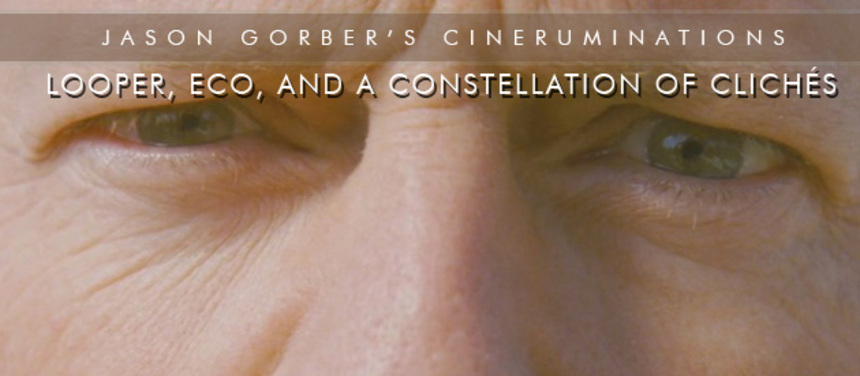
In one of Looper's most delicious scenes, two versions of the same lead character are discussing the vagaries of time travel. When asked to explain how the technology works, "old" Joe deadpans a response to deflect the question, stating that to account for time travel paradoxes, "we're going to be here all day talking about it, making diagrams with straws."
This droll response isn't just one of the movie's most amusing moments, laying bare the ease by which an older version of a character can bat away at the eagerness of his younger self, but also one of the most telling. In this instance, the script is both acknowledging our desire to understand the mechanisms behind Looper's sci-fi conceit, while blithely batting that carrot away from us. This is not a film that tries to provide answers to existential or metaphysical questions. This is the failure that besets the likes of the Wachowskis, films that become pandering as they are pondering; trying to make overt what is but a deflection from the heart of a good story.
The best sci-fi, or any form of "high concept" film, relies upon many conceits that have been taken at face value. As with a musical, where we have to take the plunge and accept that breaking out into song at inopportune times is perfectly fine, so too it is in a film like Looper that we take for granted bent laws of physics, or lightly treading upon the great works of philosophy. This is the muck in which these films wallow, and they often get bogged down in trying to articulate the consistency of the muck, rather than trying to break free from its clutches.
There have been hundreds of films that have toyed with various notions of time travel. Few have done it more convincingly than Shane Carruth's Primer, a textbook case for when a film is almost entirely shaped by the conceit that it is dedicated to explaining. Carruth's film is great fun, but its focus is far more narrow, its ambitions both more cerebral and less heroic. Primer is a time traveling film for fans of diagrams made of straws, which certainly has its place. This is not the film Looper wants to be. The fact that Johnson tasked Carruth with being a kind of "time travel expert" speaks extremely well of both filmmakers. Looper is a film that could well be picked apart on chronological terms, could delve into diagrams, but it goes out of its way, over and over, to not become bogged down. Looper is no Primer, and it's all the better for that fact.
Nor, of course, is Looper a lost episode of Star
Trek, or a mythical Back to the Future part IV. The film goes out of
its way to not fall into the extremely prevalent character of either taking
itself too seriously, or not taking itself seriously enough. When called for,
the film is brutal and unapologetic. When it needs to be, the film is coy with
its underlying themes, rarely tipping its hand about the motivations of its
characters.
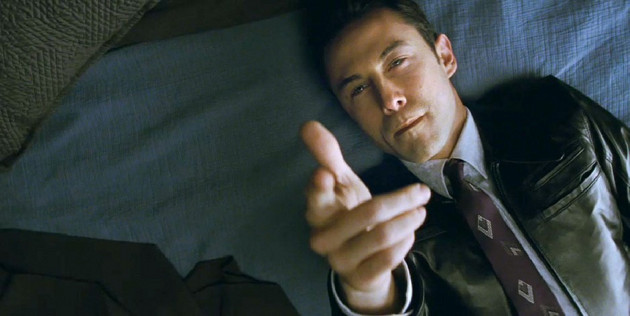
Echoes of other films are littered throughout Looper, as we're met with a veritable constellation of cinema references. Some of these references are easy to spot, others slightly more esoteric. In a recent New York Times interview, Johnson admitted that the bar where the Loopers assemble, La Belle Aurore, is "a Casablanca reference...If you take a close look at Joe's narrative arc, I totally just stole Rick's arc from Casablanca. So I named my bar after the bar they're at in Paris when the Germans are attacking. I figured I owed that movie something."
The Times writer is being overtly sarcastic when they write that in preparation for the film "Johnson
naturally started out by not watching time-travel movies at all. Or thinking
about science fiction." Naturally, Johnson is more than well versed on a myriad
of film archetypes and downright explicit references to other "sci-fi" and time
travel films. While the article allows La Jetée a cursory mention, you
can't exactly make a reference to that film, have Bruce Willis as your star,
and then feign rage against comparisons to Gilliam's 12 Monkeys.
I don't believe for a second that Johnson isn't completely fluent on what has (or hasn't) worked in previous, similar themed works. I'm betting that in addition to the films he explicitly drew from, there was an even bigger list of films that he didn't want to follow, pitfalls he wanted to avoid. What's remarkable about his film is how well those dangers were circumvented.
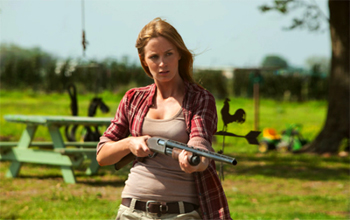
Taking some of the references that weren't made explicit in the Times article, there remains a pretty blatant one, as we've got a protective mother named Sara who is protecting her son from being "terminated" by a man from the future. More that that, it's a character that walks through hallways, double-fisting his weaponry, two guns-a-blazin' while spewing pithy one liners. It's not like Johnson's hiding any of this, it very much wears its references on its sleeve, doing so almost entirely to toy with our expectations.
The film has another lovely device to illustrate this kind of
playful genre hopping. There's a scene where our young Joe (Joseph
Gordon-Levitt) is sitting at the desk of the crime boss Abe, played adroitly
played by Jeff Daniels. Abe, we're told, has himself come back from the
future in order to make things run smoothly with the Looper organization. He's
decked out in this slick, Nehru jacket, a kind of fanciful, near-future look
that wouldn't be out of place on a Battlestar or other form of space vessel.
This is what people dress like in the future, we think, or at least what we've seen people in the past have thought people in the future will wear. This is the heart of this retro future that Johnson plays with, toying with our expectations with brief glimpses of fancy technology interspersed with the same banality that affects our current world.
Daniels teases young Joe about his silly outfit, making fun of the look that he's wearing (a simple patterned button down shirt, jacket and tie). The clothing that Joe wears is hardly out of place for us as an audience, but for Abe it's a trite affectation. The joke, of course, is this is all affectation. Levitt is in the future being retro to our present, yet is practically wearing a Halloween version of a Deckard outfit from Blade Runner.
This could have been yet another throw away moment of light comedy, but when we finally do see the gangs in the future, they're decked in even more retro outfits, oilskin cowboy jackets and wide brimmed hats. It seems the further the film takes us to the future, the more archaic the fashion references prove to be. It's as if the farther ahead we travel, the more ancient or esoteric our parasitic our shared references end up being. I can only assume 100 years past the year of Willis' timeline that some Hipster douchebag is ironically prancing about wearing a senatorial toga and eschewing electronic books in favour of stone tablets. I'm assuming, though, that they'll still be listening to music on vinyl.
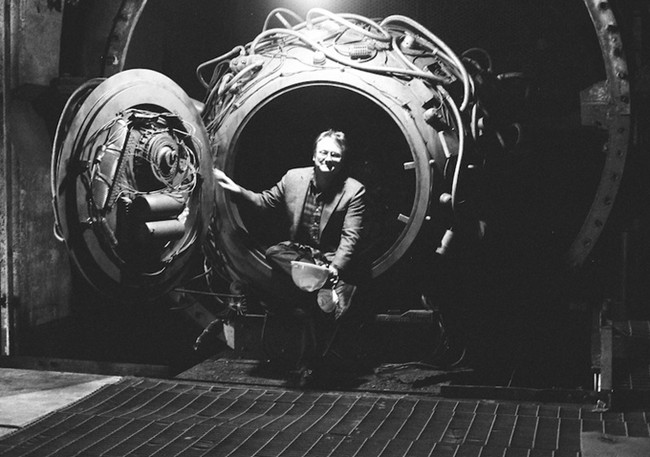
The time device itself looks like a washing machine with wires stuck onto it, no more sleek and futuristic than the portal in Being John Malkovitch. We don't need to worry about how this hunk of junk works, as that's not what this film's about. We just need to know that it does what the film tells us it does, and that's more than enough.This is not a film about technology or esoteric, metaphysical ideas, and it's all the better for it.
In my tease from TIFF, I stated that "Looper does for high concept time traveling flicks what Raiders of the Lost Ark did for Action/Adventure serials. " I did not make this allusion lightly. I was in part harkening back to Umberto Eco's 1981 essay "Casablanca: Cult Movies and Intertextual Collage". In this work, Eco goes through great leaps in trying to tease out just what makes a film like Casablanca work, and contrasts it with how a film like Raiders plays out for contemporary audiences.
Eco argues that "Casablanca is not a work of art, if such an expression still has a meaning... Casablanca represents a very modest aesthetic achievement. It is a hodgepodge of sensational scenes strung together implausibly, its characters are psychologically incredible, its actors act in a mannered way." Not such a great way for him to account for one of cinema's most celebrated works!
Eco continues, claiming that the film "nevertheless is a great example of cinematic discourse, a palimpsest for future students of twentieth-century religiosity, a paramount laboratory for semiotic research into textual strategies. Moreover, it has become a cult movie." The film, he claims, is empty of inherent meaning (hence, "palimpsest"), its effectiveness written not by its filmmakers but by fans of the work that tie its disparate elements together in a convenient whole. This, in part, is what constitutes for Eco a "cult" film.
Eco suggests that a cult film "must provide a completely furnished world so
that its fans can quote characters and episodes as if they were aspects of the
fan's private sectarian world, a world about which one can make up quizzes and
play trivia games so that the adepts of the sect recognize through each other a
shared expertise." Such a film must be "ramshackle", so that "one can unhinge
it", such a film "should not reveal a coherent philosophy of composition. It
must live on, and because of, its glorious ricketiness." Such a film, in other words, should be a beautiful mess.
Most importantly for Eco is that a cult film "must display certain textual features, in the sense that outside the conscious control of its creators, it becomes a sort of textual syllabus, a living example of living textuality." In other words, this isn't a cult film being made as a cult film, it's a kind of accidental wonder, something that its filmmakers may not have even been aware of the type of work they were creating.
Eco goes on to uncover what he feels are the multitude of archetypes that the film trades upon. These deep and systemic references are short forms, codes to our understanding of both character and location. An airplane becomes a flying horse for Eco, a bar becomes Purgatory.
For Eco, the key to Casablanca's cult status isn't that it traffics in archetypes, it's that it traffics in all of them. As Eco puts it, "Casablanca became a cult movie because it is not one movie. It is 'movies.' And this is the reason it works, in defiance of any aesthetic theory." Put another, way, "When all the archetypes burst out shamelessly, we plumb Homeric profundity. Two clichés make us laugh but a hundred clichés move us because we sense dimly that the clichés are talking among themselves, celebrating a reunion."
Looper is made up of these hundred clichés. It has even stolen, in Johnson's words, from Casablanca itself. Even if its undermining many of them throughout, it's still a film that traffics in archetype, that demands a certain familiarity with a particular dialect of filmmaking. Looper is a nerdy film for film nerds by a film nerd, and it's unapologetically constructed as such, lack of straw illustrations notwithstanding. What is no doubt its greatest achievement, however, is that it does so with supreme elegance.
Eco was quite conscious of what
set apart earlier works of cinema (movies about movies) from more winking,
contemporary works. For "what Casablanca does unconsciously, other movies will
do with extreme intertextual awareness, assuming also that the addressee is
equally aware of their purposes. These are 'postmodern' movies, where
the quotation of the topos is recognized as the only way to cope with the
burden of our filmic encyclopedic expertise." The argument against the film is that the makers of Looper are
aware of the purpose of these allusions, while we are in turn aware of their
awareness, and so the circle continues.
In contrast, Eco charges that "Spielberg and Lucas are semiotically nourished authors working for a culture of instinctive semioticians." In other words, they are well aware of the allusions and archetypes that they are relying upon, and constructing films in such a way as to exploit these references.
Eco sees this divide as such: "Casablanca explains Raiders, but Raiders does not explain Casablanca. At most it can explain ways in which Casablanca will be received in the next few years." Could we say the same thing about La Jetée and 12 Monkeys, or The Terminator and Primer, or Back to the Future, or even The Shining or Superman? Can we think of Looper without alluding to either Philip K. Dick or Philip Marlowe?
Probably not, but why would we want to? Eco is getting at something quite important, namely, that constructing a film to be a cult film is bound to fall far short from those films that come by that characteristic accidentally. Building something purposely ramshackle, or making something conform explicitly to such manifestations, take some of the fun out of it. It's those works that become quotable and comfortable do so despite themselves, versus those works that go out of their way to check off every box imaginable in order to ingratiate themselves with a niche audience.
Eco is wrong about Raiders (it's not simply a series
of self-aware tidbits, and is in many ways superior to Casablanca, entering
that pantheon of works to be considered "art"), and he's probably wrong about just how aware the filmmakers of Casablanca were in their myriad of archetypal references, as they built something purposely ramshackle. Eco's not wrong, however, about being
wary about films that try, through a shot-gunning of trite convention and
misguided semiotic theory, to graft together something that serves as a genre
picture. He is also right that a film that has a few winking allusions to certain time travel tropes would be annoying. The magic of Looper is that it has references to all of them, and in so doing, it creates something new and wonderful.
Back to that NYT interview, Johnson shares that his "favorite sci-fi... always uses its hook to amplify some bigger theme or idea -- some emotional thrust." We don't need to know about the straw diagram, as much as we want to. We don't need to know the Terminator allusions to enjoy the work, or why they're wearing cowboy hats, or why to go to China instead of France (the extra-diagetical reasons that tie Chinese funding of the production make that debate even more tired). This isn't some Leslie Nielsen/Mel Brooks-like nod to genre convention. Looper doesn't sidestep these issues because its empty of content or because its writers hadn't thought these things through, it sidesteps these elements because almost always their achingly boring. Even when they're mildly amusing, they're still a distraction, still very much focusing on the broader mechanism or conceit of the narrative rather than what's really driving the story along.
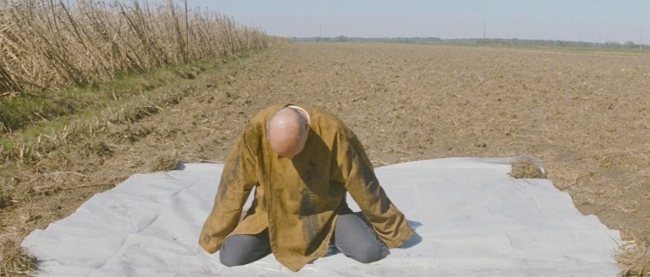
One of the more interesting allusions that Johnson admits to is a different Harrison Ford film than might first come to mind, the Amish murder neo-noir film, Witness. As the director explains to the Times, "it starts in the city, creates this noir-type tension and atmosphere, then transfers to the farm, but loses none of that momentum and keeps you in suspense until the end...which is like a magic trick to me.." Further, there's a rural prologue that takes place before the film shifts gears, a device that "helps acclimatize you to the visual world of the farm." Johnson does the same with his own film, creating a pastoral opening shot, and setting the executions in the midst of a field. By the time the film shifts to its rural finale, Johnson tells the Times, "it's not like we're going into a room we've never been in before."
The same can be said for the film as a whole. Johnson's film takes us to rooms we've been, often several times. His film has rich echoes of sci-fi classics and cool Western motifs, of French café pieces or Tarantino character pieces. By Eco's definition, Looper is "merely" post-modern, a pastiche of references and sub-references that work for the community of the initiated. I think Johnson's film is much more than the sum of its myriad references, and I think it does a remarkable job of creating something truly new and inspiring while never being afraid of its constituent pieces.
The twelve notes that make up the Western scale have for
hundreds of years been shaped and reshaped to craft ever more elegant (or
purposely simplistic) constructions. If Beethoven's "Pastoral Symphony" and "Louie Louie"
use the same I-IV-V progression, does that take away from the genius of either?
Eco would suggest that since Richard Berry presumably wasn't channeling Beethoven (or "La Bamba",
for that matter) when he wrote the tune, the connection between the
two is somehow more, I don't know, "honest", something that the audience is drawn to as an object of fascination because of this ramshackle connection..
But what of someone like Frank Zappa, who had a decades long fascination
with "Louie" and its roles as a cornerstone of both popular and symphonic music? Here was an artist unafraid to mix the high and the low, the
silliness of the Louie-cadence with the sophistication of the 20th
century serialists. He was an artist that could take the trite and cliché, love them without denigrating them, re-situating these elements the way the best orchestrators can. The pieces work as direct allusion to the cliché, yet are assembled with a craft that creates something unique and excellent all to its own.
Johnson, it strikes me, is doing the same. He's crafting art
knowing full well which constituent pieces he can allude to in order to provide
short cuts of comprehension, yet does so quite often while both undermining and celebrating those
exact elements.Sometimes he can just talk of straw diagrams, and for those versed in his language, we can skip ahead to what's important. This is very hard to do without coming across as a twit.
For those not versed, the film still works, as we've not been bogged down by talks of formalism, motivation or technique. This is a third way that Eco's response doesn't account for. This is the way in which Looper succeeds.
It's far too early to tell just what kind of long term reception that Looper is going to garner. If there's any justice, it will find its audience well before needing to be considered something only for the cult fetishists or sci-fi fans. Looper isn't just a fun and entertaining film, I think it may also be a great film, full of vigour and intelligence, both stylish and compelling and eminently rewatchable. It's a high concept thriller beautifully executed, and it doesn't take a whole lot of imagination to imagine how in lesser hands the film could easily have been a repugnant abomination.
By feeding on what came before, incorporating those elements, and reflecting them back upon themselves, Looper joins that small list of literate, literary films confident in both its execution and ambitions to call attention to both its predecessors and its inherent limitations in form. In doing so, it's not simply winking at its audience, it's complicit with those willing to fully commit to the story, letting us know that we're in safe hands and being treated like adults, able to follow a relatively sophisticated narrative without needing every beat telegraphed and reemphasised repeatedly.
If Raiders of the Lost Ark did the same, if is to be seen as a remarkable amalgamation of past elements that nonetheless creates its own unique form, then Looper deserves to be celebrated in the same way. We've all no doubt seen numerous failures to achieve such a fine balance, all from films that didn't necessarily set out to be awful. If we, like Eco, are to look for those happy accidents, we can see in both Raiders and Looper two films transcend both their conceits and their built-in expectations. Each film is a fortuitous wonder, buttressed by the almost miraculous fact that it all comes together with such haphazard elegance.
Only time can tell if Looper is worthy of such praise, but for me, on only a single viewing, I found it to be an astonishing accomplishment. Like Raiders, and for that matter Casablanca, it's a film I look forward to getting old with, to see over and over as I proceed through my own particular timeline.







